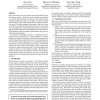Free Online Productivity Tools
i2Speak
i2Symbol
i2OCR
iTex2Img
iWeb2Print
iWeb2Shot
i2Type
iPdf2Split
iPdf2Merge
i2Bopomofo
i2Arabic
i2Style
i2Image
i2PDF
iLatex2Rtf
Sci2ools
157
click to vote
ASPLOS
1994
ACM
1994
ACM
Compiler Optimizations for Improving Data Locality
In the past decade, processor speed has become significantly faster than memory speed. Small, fast cache memories are designed to overcome this discrepancy, but they are only effective when programs exhibit data locality. In this paper, we present compiler optimizations to improve data locality based onasimple yetaccurate cost model. The model computes both temporal and spatial reuse of cache lines to find desirable loop organizations. The cost model drives the application of compound transformations consisting of loop permutation, loop fusion, loop distribution, and loop reversal. We demonstrate that these program transformations are useful for optimizing many programs. To validate our optimization strategy, we implemented our algorithms and ran experiments on a large collection of scientific programs and kernels. Experiments with kernels illustrate that our model and algorithm can select and achieve the best performance. For over thirty complete applications, we executed the origina...
Related Content
| Added | 09 Aug 2010 |
| Updated | 09 Aug 2010 |
| Type | Conference |
| Year | 1994 |
| Where | ASPLOS |
| Authors | Steve Carr, Kathryn S. McKinley, Chau-Wen Tseng |
Comments (0)

